As the Dallas Cowboys gear up for another competitive season, they find themselves at a crucial crossroads, one that could define their trajectory for years to come. With a wealth of cap space signaling readiness to invest, the organization has an impressive opportunity on its hands: extending contracts for key players from their 2022 draft class, particularly standout athletes like Micah Parsons, Tyler Smith, Jake Ferguson, and DaRon Bland. Each holds significant potential not just for immediate impact but for long-term team success.
Micah Parsons, an All-Pro pass rusher with accolades rapidly stacking up, symbolizes the Cowboys’ core aspiration—retaining talent that can define a franchise. As Parsons enters the final year of his rookie contract, his extension would not only solidify his future with the team but also strategically manage salary cap implications. The prevailing narrative around Parsons reflects a strong desire from both sides to strike a deal, suggesting that the Cowboys have a fertile ground to cultivate a legacy of loyalty and commitment.
Foundational Cornerstones: The Importance of Protecting Young Talent
The urgency is palpable, especially for Tyler Smith, a dazzling first-round draft pick and Pro Bowl guard. At just 24 years old, his ascent as a leader on the offensive line is crucial, especially following the retirement of veteran Zack Martin. Smith’s resolve to uphold the traditions of excellence observed in his predecessors is commendable. Building an offensive line is akin to constructing the very foundation of a home; it requires not just solid materials but skilled craftsmanship that will endure. Smith embodies that ethos, making his retention an essential priority for the organization.
Meanwhile, the potential of Jake Ferguson and DaRon Bland cannot be overlooked. Ferguson’s performance as a tight end, notably his 71 receptions for 761 yards in 2023, illustrates his adaptability and skillset. Ngbig strides are also seen in Bland, who notched up nine interceptions and an NFL record of five pick-sixes in 2023. However, injuries hampered both players in 2024, which complicates their contract situation. Herein lies the delicate balance the Cowboys must navigate; investing in players with undeniable talent yet marred by injury histories requires both foresight and careful consideration of risk.
The Cowboys’ Changing Philosophy on Extensions
Historically, the Cowboys were known for their proactive approach to contract extensions, securing their rising stars before they even contemplated hitting the free-agent market. This strategy has lessened in recent years, showcasing a reluctance to preemptively commit large sums without assessing potential value. It is worth noting that making such investments often comes with risks and uncertainties; however, the upside of locking in young talent can lead to long-term stability and success.
The market has shifted dramatically—contracts now reflect explosive growth, with players demanding higher salaries. For instance, Derek Stingley Jr.’s recent extension with the Texans set the stage for what could be expected for a talent like Bland, while the compensation to wideouts like Ja’Marr Chase underscores the urgency of aligning player salaries with their on-field contributions. Moreover, the Cowboys can take cues from their own past, where large guarantees and longer contracts enabled them to effectively manage their roster’s financial dynamics.
The Balancing Act: Compensation, Risk, and Team Philosophy
A challenging aspect of negotiating extensions with young players is aligning their expectations with what the team can realistically offer. While Parsons, who has expressed a desire to remain a Cowboy for life, may command a premium, Ferguson and Bland present different variables that carry weight based on their recent injury backgrounds. The Cowboys can’t afford to overextend themselves financially or compromise their future by offering unsustainable deals.
What is particularly concerning in this current landscape is the Cowboys’ apparent hesitation compared to their historical stance. The vacuum of player extensions has the potential to deter young stars and complicate negotiations. Given that the franchise tag could tie the team’s hands in terms of flexibility next season, the organization’s strategy must evolve to ensure they are not left in a position where they lose valuable players to free agency when they could have secured them at a more manageable cost.
The power play lies in communicating a vision for future success that resonates with their talents. The Cowboys would benefit immensely from showing that their judgment is rooted in faith in their players’ upside, even if it involves taking calculated risks with their contracts. Investing in a robust roster and ensuring that key players are committed to their journey is the hallmark of a forward-thinking franchise.
The cowboy’s challenge is clear. Time is of the essence; an offensive line leader, a generational pass rusher, and reliable talents like Ferguson and Bland shouldn’t be allowed to drift into uncertainty. Sensibly navigating these extensions could very well redefine the Cowboys’ narrative for years to come.

